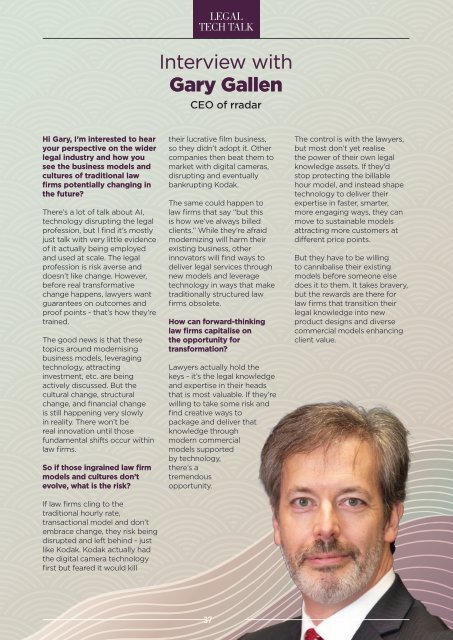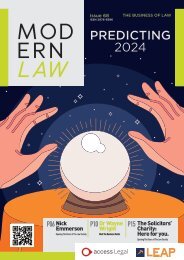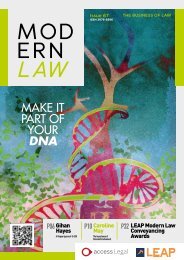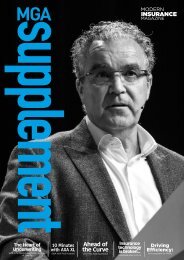Modern Law Magazine Issue 69
You also want an ePaper? Increase the reach of your titles
YUMPU automatically turns print PDFs into web optimized ePapers that Google loves.
LEGAL<br />
TECH TALK<br />
Interview with<br />
Gary Gallen<br />
CEO of rradar<br />
Hi Gary, I’m interested to hear<br />
your perspective on the wider<br />
legal industry and how you<br />
see the business models and<br />
cultures of traditional law<br />
firms potentially changing in<br />
the future?<br />
There’s a lot of talk about AI,<br />
technology disrupting the legal<br />
profession, but I find it’s mostly<br />
just talk with very little evidence<br />
of it actually being employed<br />
and used at scale. The legal<br />
profession is risk averse and<br />
doesn’t like change. However,<br />
before real transformative<br />
change happens, lawyers want<br />
guarantees on outcomes and<br />
proof points - that’s how they’re<br />
trained.<br />
The good news is that these<br />
topics around modernising<br />
business models, leveraging<br />
technology, attracting<br />
investment, etc. are being<br />
actively discussed. But the<br />
cultural change, structural<br />
change, and financial change<br />
is still happening very slowly<br />
in reality. There won’t be<br />
real innovation until those<br />
fundamental shifts occur within<br />
law firms.<br />
So if those ingrained law firm<br />
models and cultures don’t<br />
evolve, what is the risk?<br />
their lucrative film business,<br />
so they didn’t adopt it. Other<br />
companies then beat them to<br />
market with digital cameras,<br />
disrupting and eventually<br />
bankrupting Kodak.<br />
The same could happen to<br />
law firms that say “but this<br />
is how we’ve always billed<br />
clients.” While they’re afraid<br />
modernizing will harm their<br />
existing business, other<br />
innovators will find ways to<br />
deliver legal services through<br />
new models and leverage<br />
technology in ways that make<br />
traditionally structured law<br />
firms obsolete.<br />
How can forward-thinking<br />
law firms capitalise on<br />
the opportunity for<br />
transformation?<br />
<strong>Law</strong>yers actually hold the<br />
keys - it’s the legal knowledge<br />
and expertise in their heads<br />
that is most valuable. If they’re<br />
willing to take some risk and<br />
find creative ways to<br />
package and deliver that<br />
knowledge through<br />
modern commercial<br />
models supported<br />
by technology,<br />
there’s a<br />
tremendous<br />
opportunity.<br />
The control is with the lawyers,<br />
but most don’t yet realise<br />
the power of their own legal<br />
knowledge assets. If they’d<br />
stop protecting the billable<br />
hour model, and instead shape<br />
technology to deliver their<br />
expertise in faster, smarter,<br />
more engaging ways, they can<br />
move to sustainable models<br />
attracting more customers at<br />
different price points.<br />
But they have to be willing<br />
to cannibalise their existing<br />
models before someone else<br />
does it to them. It takes bravery,<br />
but the rewards are there for<br />
law firms that transition their<br />
legal knowledge into new<br />
product designs and diverse<br />
commercial models enhancing<br />
client value.<br />
If law firms cling to the<br />
traditional hourly rate,<br />
transactional model and don’t<br />
embrace change, they risk being<br />
disrupted and left behind - just<br />
like Kodak. Kodak actually had<br />
the digital camera technology<br />
first but feared it would kill<br />
37
















